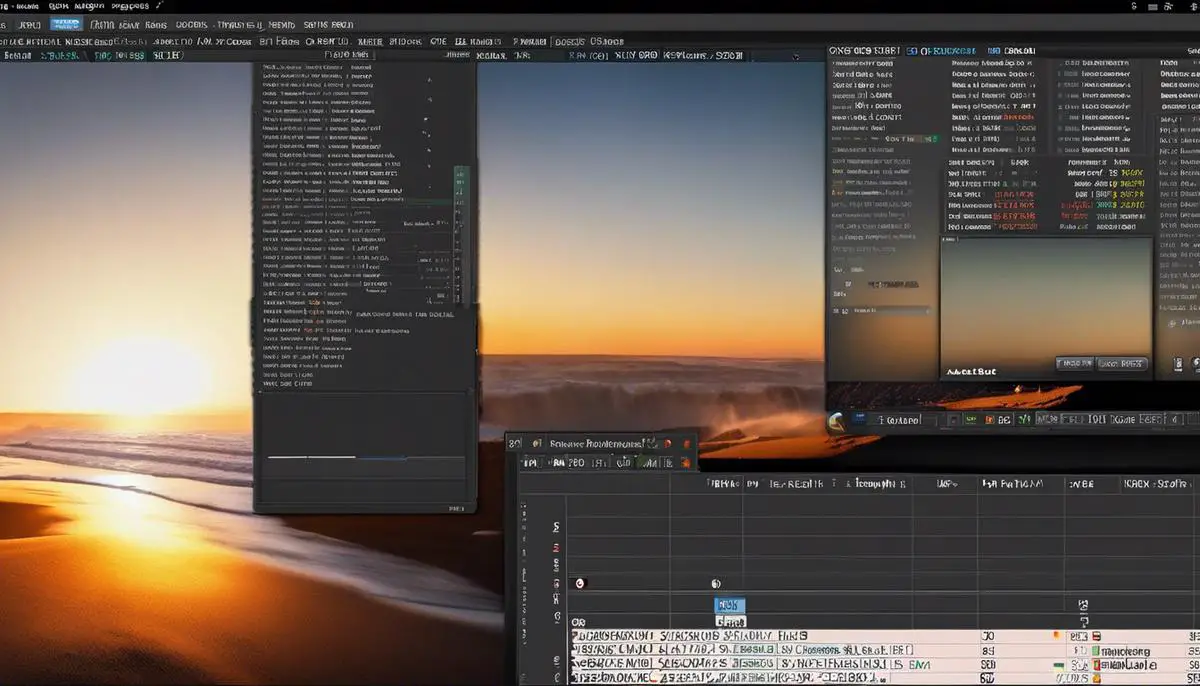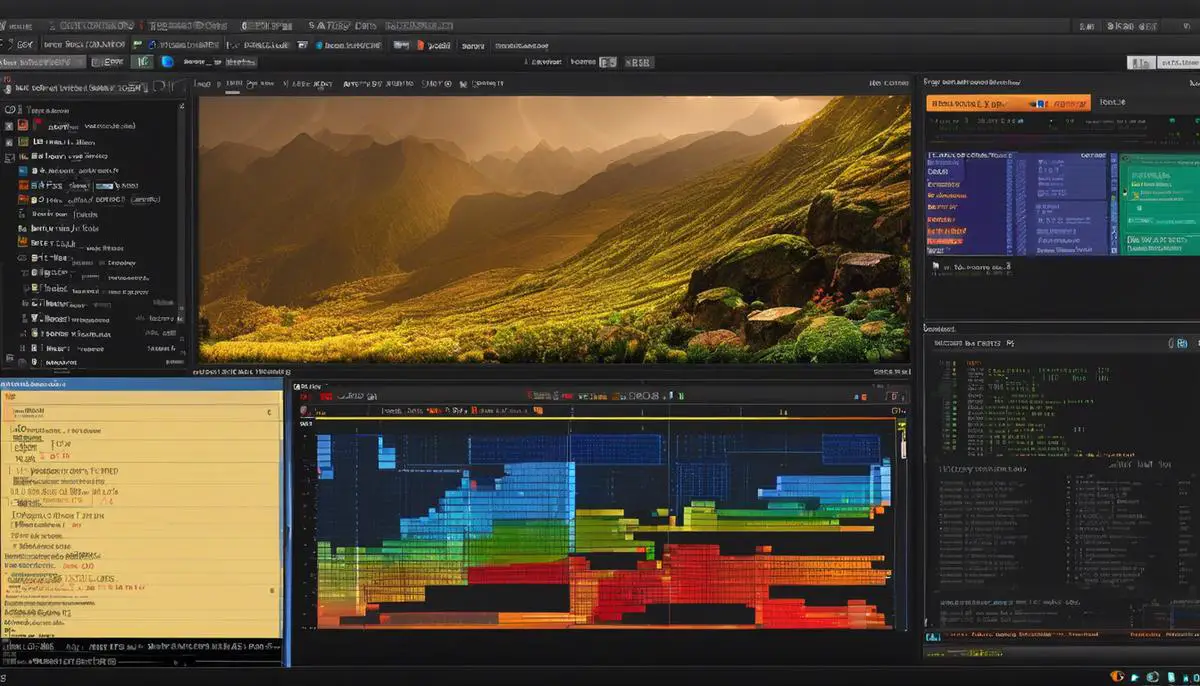Hex Editors are versatile tools that allow users to manipulate the binary data of files. These practical utilities are an essential component in any programmer’s toolbox, particularly in the realm of Linux. But to fully leverage the potential of Hex Editors, we need a deeper understanding of their intricacies. Beginning with an introduction to Hex Editors and their relevance in Linux, we journey through the distinctive features and compare some of the top choices in the market. We’ll also delve into the powerful world of automation and how Hex Editors for Linux can streamline tasks through the use of automated scripts and algorithms.
Understanding Hex Editors
Demystifying Hex Editors in the Linux Landscape
To the uninitiated, the concept of hex editors might seem like a somewhat mysterious aspect of technology. But to seasoned tech enthusiasts, these powerful tools are an integral part of everyday coding and debugging processes. So, what exactly is a hex editor and how does it function in a Linux environment? Let’s dive right in and demystify this exciting piece of tech!
Hex editors are essentially programs that allow users to view and modify the binary (i.e., hexadecimal) data of a file. It’s like a magnifying glass for data; it lays bare the underpinning structure for closer examination and adjustment. One could equate it to an incredibly detailed ‘Find and Replace’ tool that operates at file’s most fundamental level.
In the world of Linux scripting and development, hex editors play an incredibly significant role. The universality of Linux makes hex editors even more popular for anyone keen on peeling back the layers to operate at the binary level. Think of it in terms of a digital surgery kit which allows to dissect a file’s raw and unfiltered binary or hexadecimal level.
Now, these might be some questions popping up: How does it operate? How does it function in a Linux environment?
Using a hex editor in Linux usually starts by launching it from the terminal. Once launched, users can open any file in the editor to view its hex values. It’s straightforward, direct – designed to provide as little distraction from the task at hand as possible.
Hex editors in Linux come packed with features extending way beyond simply viewing and editing hexadecimal data. Some allow direct parser creation for file structures, enabling operations at even more granular levels. Others facilitate binary comparisons between different files, shedding light on the subtle differences and similarities in their hex composition.
Indeed, without hex editors, certain tasks would become unnecessarily laborious, if not downright impossible. For instance, recovering deleted files, cracking binary passwords, or editing the binary data of compiled programs. Hex editors provide a practical, efficient toolset for all of these tasks and more.
The world of Linux hex editors is rich and diverse. Renowned tools such as GHex, Bless, or Hexcurse each bring something unique to the table, be that a friendly GUI, seamless integration with other software, or raw, bare-bones efficiency. Whichever the users decide is best for their specific needs, there’s no denying the indispensability of hex editors in the Linux toolkit.
Hex editors in Linux encapsulate the tech enthusiast’s unbounded curiosity. They exemplify the drive to break the unbroken, to see what’s underneath, to understand, and to rebuild. To operate in the world of tech, it becomes imperative to understand and gain mastery over these binary tools of the trade.
The journey into hex editing might seem daunting. But fear not! With a little time, patience, and practice, one can get a firm grasp of their functionalities. To quote a famous phrase: “The journey of a thousand miles begins with a single step.” And perhaps, for some, that step starts with bytes of a hex editor in a Linux environment.

Distinctive Features of Hex Editors for Linux
The Distinctive Attributes of Linux Hex Editors: Unleashing Potential
In the realm of tech, we are dedicated to redefining boundaries with modern tools like Hex editors, particularly in the environment of Linux. Here, specific features distinguish Linux Hex editors from their counterparts. These points of divergence are compelling enough to pique the interest of tech enthusiasts and tinkerers alike, inviting them to plunge deeper into the fascinating world of Hex editing in Linux.
Want to talk customization? Linux Hex Editors leave you gunning for more. They offer weighted customization options, tailoring the tool to your working style and requirements. Certain Hex editors like Oketa even allow users to adjust its appearance, reducing eye-strain and increasing productivity. But it doesn’t stop there, editors such as wxHexEditor can handle files of any size, a feature that is incomparable with majority of Windows based Hex editors.
A salient feature that is determinant of its edge over others is the extreme resilience and recovery. Linux systems are inherently more stable and rarely crash. Consequently, Hex Editors such as GHex, Bless and Hexcurse extend this stability, allowing you to work with peace of mind knowing that the system is unlikely to crash and lose your work.
Additionally, Hex editors in Linux often offer the opportunity to launch multiple editing windows simultaneously. This multi-editing function allows complex tasks to be accomplished more efficiently, saving substantial amounts of time in practice.
Take the case of Bless; it features multilevel undo and redo operations that can be conducted efficiently on large data files. This is particularly useful when manipulating a large chunk of hexadecimal data, as any inadvertent changes made can be quickly and efficiently rescinded.
Did someone mention automation? Radare2, for instance, is not just a Hex editor, but also a comprehensive framework for reverse engineering. This versatile tool can help you automate hex editing tasks, like scripting with a variety of options, perfect for those whose motto is ‘Work smarter, not harder.’
The speed of these Hex editors is also worthy of managing expectations. Unlike some other Hex Editors that slow down with larger files, Linux Hex editors are designed to handle large files without sacrificing speed or efficiency.
In the heart of Linux Hex editors lies potential growth opportunities for tech personnel of all levels. Not only is Hex editing a useful skill in the tech industry, it also underpins tasks such as file recovery, programming, and debugging. Mastering Hex editors in Linux therefore, is not just a hobby, it’s a credential strengthening card.
It is plain to see why Hex editors for Linux are well-regarded in the tech sphere. With distinctive features like robust customizability, multi-window editing, recovery resilience and speed, these tools are inherent game changers. Whether you’re a seasoned tech guru or a sapling in the field, it’s a good day to dive headfirst into the captivating realm of Hex editing in Linux.

Best Hex Editors available for Linux
When discussing the best Hex Editors for Linux, it’s essential to delve deeper into additional features these tools offer beyond the basics. So, let’s plunge right into the specifics that discern top-notch Hex editors from the run-of-the-mill.
One particularly noteworthy trait in elite Hex editors is the extensive customization options they provide. Renowned Heath editor, Okteta, for instance, offers various viewing modes, customizable data layout and a well-designed interface demonstrating this. Such customizability enables users to adapt the tool to cater to their specific and unique needs, thus enhancing operability and productivity.
But while aesthetics are important, function comes first. Hex editors like wxHexEditor allow you to handle files of any size, whether you’re dealing with a meager KB file or an archaic 5TB database. This capability ensures that regardless of file size, you’re never left in want when using these Hex editors.
Every Linux enthusiast understands the occasional system hiccups – the last thing you want is losing hours of work from an unexpected crash. Here’s where resilience and recovery measures shine in Hex editors. Tools such as GHex save your last session and employ crash recovery mechanisms, ensuring that your work is safe and retrievable in such unforeseen events.
In a modern tech-driven world, multitasking is the name of the game. A feature-laden Hex editor like Hexedit shows clear comprehension of this, offering the possibility of launching multiple editing windows simultaneously. This way, you can manipulate multiple files concurrently, boosting work efficiency.
The Hex editor ‘HxD’ offers multilevel undo and redo operations, providing a safety net for all edits. Picture working with code ten layers deep only to realize an error in the second layer primary assertion. Panicked? Not with this feature. Navigate back to the problematic line, fix the issue, and then reapply the subsequent changes.
Consider the utility provided by automation. Hex editor 010 Editor integrates with scripting languages, which allows automating repetitive tasks. It becomes possible to design macros to undertake regular tasks, providing increased efficiency and precious time saving.
Finally, it’s all about speed. When you’re handling enormous files, the Hex editor must be capable of keeping pace. Hex editors like Bvi and HexFiend establish their superiority with fast search and replace operations, ensuring your work continues smoothly and rapidly without getting bogged down by lag.
To conquer the IT field, mastering tools like Linux Hex editors is not just an added advantage; it’s necessary. Their diverse features provide an unmatched versatility, helpful for both simple tasks or tackling complex anomalies. Those who invest time in understanding their operation will likely find themselves on an accelerated trajectory towards tech mastery. So, continue diving into the realm of these diverse Hex editors and prepare to stand out in this ever-evolving tech world.

Using Hex Editors for Automation
With the pervasive growth in IT industries and more sophisticated data handling challenges, tech enthusiasts have started diving into unique tools, one of which is Hex editors in a Linux environment.
As we delve deeper into the world of Hex editors, alongside the popular ones like GHex, Bless and Hexcurse, the realization of their essentiality only gets stronger.
Linux Hex editors stand out in their ability to customize. You have the flexibility to modify as per your requirements. With the optimal use of these editors, be ready to work on gigantic files; size is not an issue here. Added to that, these platforms are resilient, with built-in recovery mechanisms that spell revival of your lost or corrupted files. Such a feature can be a lifesaver in crisis situations when data recovery is paramount.
A remarkable aspect of Linux Hex editors that deserves mention is their provision for multitasking. Invoke multiple editing windows simultaneously to streamline tasks. This is an excellent way to compare or work on different sections of a file. Along with simultaneous multitasking functionality, the in-built multilevel undo and redo operations are invaluable to simplify editing tasks.
What sets these editors a class apart are their automation capabilities, which are a boon in the era of speed and efficiency. Scripting languages such as Python can be utilized for automated tasks. Need to make multiple changes? Automate the ‘search and replace’ operation and see the massive time advantage you gain.
Furthermore, mastering Linux Hex editors can significantly hasten your personal and professional growth trajectories in the tech field. Recruiters today prioritize candidates with an extensive skill repertoire, and proficiency in Hex editors may just land you the coveted job you desire.
In the constantly evolving tech arena, Hex editors for Linux not only symbolize progress but are also a nod towards the future. It’s a surging wave that’s worthwhile to ride on. Tech enthusiasts are continually on the hunt for the best tools to simplify and automate tasks, and Linux Hex editors are a testament to the same.
Dive into the world of hex editing in Linux, explore, experiment, learn, and watch the wonders roll. You wouldn’t prefer to lag when automation, speed, resilience and customization are all wrapped into one, would you? Seize the opportunity today, and take a step forward in the tech world.

As we have explored, Hex Editors are not just tools for viewing and modifying binary files. They play a significant role in task automation, making our Linux programming tasks more efficient. A firm understanding of these tools will empower users to make the most of their Linux environment, whatever their specific requirements might be. From choosing the right software to understanding its features and application in automation, our journey through Hex Editors shows that they are invaluable tools in our coding arsenal. Remember, the right Hex Editor will not only meet your current needs, but it will also adapt and grow alongside your developing Linux skills.
